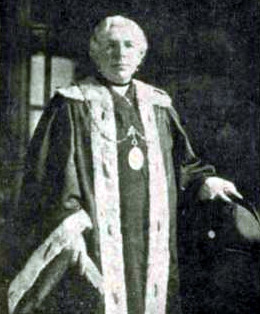Mary Bell (politician) facts for kids
Quick facts for kids
Mary Bell
|
|
|---|---|

Mary Bell in 1926 by an unknown photographer.
|
|
| Born | 1885 Glasgow, Scotland
|
| Died | 1943 (aged 79–80) Glasgow, Scotland
|
| Nationality | Scottish |
| Occupation | Politician |
| Known for | Local Politics |
Mary Bell (1885–1943) was an important Scottish politician. She was one of the first women in Scotland to be chosen as a local councillor. She also became the first female senior magistrate in the city of Glasgow. This means she was a very important judge in the city.
Contents
Mary Bell's Political Work
Mary Bell was part of a special group of five women. They were pioneers, meaning they were among the first to do something new. These women were elected as councillors in 1920. Other women elected at that time included Jessica Baird-Smith and Mary Anderson Snodgrass. Eleanor Stewart (trade unionist) and Mary Barbour were also elected.
Mary Bell became a councillor for the Langside area of Glasgow. She was also the first woman magistrate to represent the Glasgow Corporation. This happened at a hearing of the High Court in Glasgow.
Taking on New Roles
In 1924, Mary Bell received a promotion. She became the depute river baillie of Glasgow. At the same time, Mary Barbour was chosen as a baillie. A baillie is a type of local official or magistrate. People were very happy about their appointments. Reports said that "their appointment was greeted with cheers."
Mary Bell believed it was important for women to be involved in public life. She wanted to show that women could handle all parts of public service. This included both the easy and the difficult tasks. She felt it was important for women to prove their strength.
Fighting for Women's Rights
Mary Bell was a suffragist. This means she supported the right for women to vote. She was also a member of the Women's Freedom League. This group worked hard for women's rights.
She helped set up the Cathcart branch of a group called the National Union of Societies for Equal Citizenship. Mary Bell was also a vice-president of the Shawlands Women's Unionist Association. She was a member of the Tradeston Women's Unionist Association too.
Mary Bell served on the committee of the Dykebar Asylum. She was also one of the directors of the Lenzie Convalescent Home. These roles show her dedication to public service.
Family in Politics
In 1938, Mary Bell's son, Arthur, also became a councillor. He was elected in a special election. This happened in the Camphill Ward of Glasgow. It shows that public service ran in their family.
 | Precious Adams |
 | Lauren Anderson |
 | Janet Collins |

